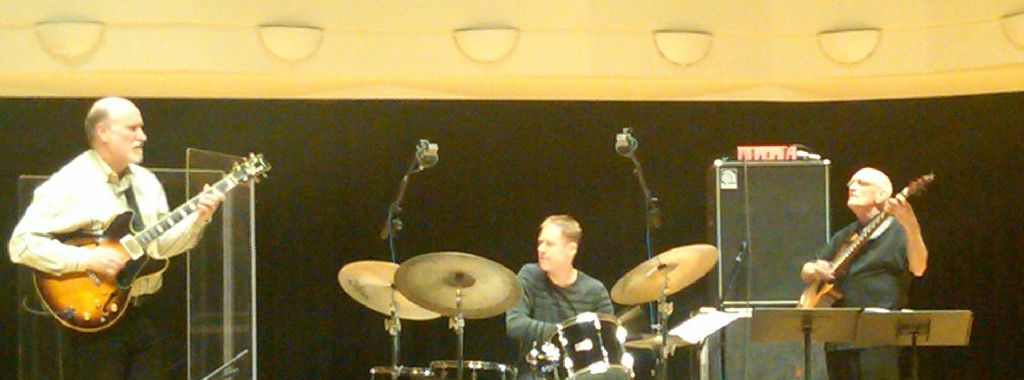 April is International Guitar Month. If you didn’t know that, you’re not alone. When Sean McGowan, a guitar professor at the University of Colorado-Denver announced it at the King Center Friday night, even the star performer, John Scofield was surprised. He quipped that every month was guitar month for him, but he was glad to have three more weeks to celebrate officially. Scofield was in Denver as part of UCD’s Guitar Fest, a three-day celebration featuring several master classes and concerts, and his trio (with Steve Swallow on electric bass and Bill Stewart on drums) closed the festival with an 80-minute set that offered a wide range of musical styles, all molded to fit the parameters of a jazz guitar trio.
April is International Guitar Month. If you didn’t know that, you’re not alone. When Sean McGowan, a guitar professor at the University of Colorado-Denver announced it at the King Center Friday night, even the star performer, John Scofield was surprised. He quipped that every month was guitar month for him, but he was glad to have three more weeks to celebrate officially. Scofield was in Denver as part of UCD’s Guitar Fest, a three-day celebration featuring several master classes and concerts, and his trio (with Steve Swallow on electric bass and Bill Stewart on drums) closed the festival with an 80-minute set that offered a wide range of musical styles, all molded to fit the parameters of a jazz guitar trio.
Swallow plays a 5-string hollow-bodied electric bass which offers a rounder sound and a decay typical of an acoustic bass. Scofield’s guitar is also hollow-bodied, but some of the effects he created sounded like a solid-bodied instrument. Stewart’s drums were at center stage, and at first glance it seemed that his pair of floor toms and three suspended cymbals would be a bit much for a trio setting. However, the high-energy sounds from Scofield and Swallow justified the larger drum kit.
I’ve heard Scofield play full-bore sets of power guitar, but his set at the King Center showed many different sides of his talent. On his original funk piece, “Green Tea”, he alternated groups of abstract block chords with soulful wails, yet on the next tune, Miles Davis’ “Budo”, he played a purely linear solo that conformed to traditional bop style. Later, on another bop standard, “Wee”, Swallow dropped out midway through Scofield’s solo, and while the guitarist used the opportunity to move away from the form and the chords, the improvised lines were still idiomatic to the music.
The most challenging works appeared in the middle of the program. “Plain Song” had a two-beat country feel at its core, but each member of the group found ways to expand the music from its rustic origins. Stewart played a complex rhythm pattern over the basic pulse, which created subtle cross-rhythms throughout the piece, while Swallow invented a bass line that expanded the basic harmony and interacted with Stewart’s cymbals. On top of this shifting rhythm, Scofield superimposed chords that sounded like contemporary classical music. Yet, the group molded these disparate parts into a unified composition. The next piece carried an odd, but appropriate name: “Chicken Dog”. Like its title, it was hard to decipher just what this piece was—there were a number of different styles present, but the mixtures were unique, and it seemed that Scofield, Swallow and Stewart were discovering a new unnamed style right there on the stage. The three musicians created incredibly dense structures throughout the concert. On “The Low Road”, Scofield broke up the time in chunks of two or three beats, and after awhile, the downbeats seemed hopelessly lost within the abstractions of the rhythm. However, the trio knew exactly where they were, and at the end of Scofield’s solo, they all landed on one at the same moment.
Scofield balanced these dense moments with pared-down standards and lyrical originals. Their version of George Gershwin’s “Someone to Watch over Me” was a piece of pure beauty, with Swallow playing elegant melodies on his bass, and Scofield answering with lovely chords and sensitive solo lines. Here, and on the coda to Carla Bley’s “Lawns”, Scofield used a delay to great artistic advantage, creating a musical dialogue with only one instrument. And at the end of the show, Scofield avoided the obvious guitar fireworks and played a lovely country waltz that calmed the crowd with its simplicity and grace. And for an audience that included many young guitar students, that adroit piece of programming may have been the best lesson Scofield offered all night.
Photo by Thomas Cunniffe.